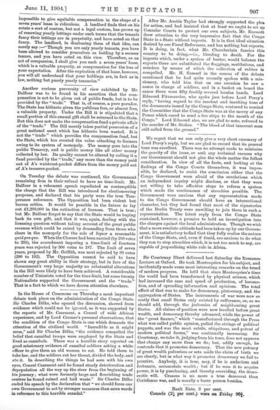In the House of Commons on Thursday a most important
debate took place on the administration of the Congo State. Sir Charles Dilke, who opened the discussion, showed from evidence which could not be ig,uored, as it was supported by the reports of Mr. Casement, a Consul of wide African experience, and by Lord Cromer's personal observations, that the condition of the Congo State is one which demands the attention of the civilised world. "Incredible as it might seem," said Sir Charles Dilke, "the evidence compelled the belief that cannibal troops were employed by the State and lived as cannibals. There was a horrible story reported on good missionary evidence of cannibal soldiers asking a white officer to give them an old woman to eat. He told them to take her, and the soldiers cut her throat, divided the body, and ate it. In describing the things he had seen with his own eyes, Consul Casement said he found steady deterioration and depopulation all the way up the river from the beginning of his journey ; what were formerly large and flourishing trade centres he found ruined and laid waste." Sir Charles Dilke ended his speech by the declaration that "we should force our own Government to act by stronger measures than mere words in reference to this horrible scandal."










































 Previous page
Previous page